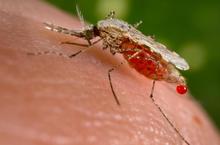Although no cases of Eastern Equine Encephalitis (EEE) in North Carolina have been reported in humans this year, the N.C. Department of Public Health has confirmed the death of a Cumberland County horse identified as having the disease.

Disease-carrying mosquito gorging on blood
The North Carolina Department of Public Health has confirmed the death of a Cumberland County horse identified as having Eastern Equine Encephalitis.
© 2015 by USGOV-HHS-CDC
The case, which was reported to the state on July 7, indicates the disease is present in the county, and state and local public health officials are advising people to take precautions to protect themselves and their horses.
Eastern Equine Encephalitis (EEE) virus tends to occur in outbreak form and is transmitted to horses by mosquitoes that have fed on infected wild birds.
The normal geographical distribution of EEE cases in horses occurs east of the Mississippi River, typically including the coastal states of Alabama, Florida, Georgia, Louisiana, Maryland, Mississippi, New Jersey, North Carolina and South Carolina, although cases have occurred in the midwestern states of Indiana, Michigan and Ohio and as far west as California.
EEE virus attacks the central nervous system and unvaccinated horses are very susceptible to the infection. The disease appears within five days after a mosquito transmits the virus to the horse. Onset of clinical symptoms are abrupt and infected horses often die within three days.
Symptoms include:
- Fever
- Sleepy appearance
- Muscle twitches in head, neck, shoulder and flanks
- Staggering gait
- Recumbency
Prevention
Annual vaccination of all horses and other equines is recommended. Horses vaccinated for the first time must receive an injection of EEE-WEE combined vaccine, followed by a second dose three to four weeks later.
The two-dose series is necessary to establish an effective immune response. If an outbreak occurs in the area, a second booster is advised.
Foals should be vaccinated at 4, 5, and 6 months of age for a total of three doses. Another booster should be given in six months and annually from then on.
In addition to making sure that all equines are vaccinated, horses should be taken in at times when the mosquito population is highest. This usually includes the hours around dawn and dusk. In some cases, horses can be blanketed or covered with protective gear to prevent bites. Insect repellant can be used on horses to prevent bites from mosquitoes.
In all cases, the population of mosquitoes should be controlled as much as possible by following the recommendations of mosquito-control personnel and the agencies in the area where horses are kept.
Any bodies of stagnant water should be drained and water-holding containers such as buckets, tires and other receptacles where water might accumulate should be emptied. Horse troughs and waterers should be flushed often to reduce mosquitoes near paddock areas.
Insecticides for treating mosquito nesting areas around homes and livestock premises should be used on a regular basis.
